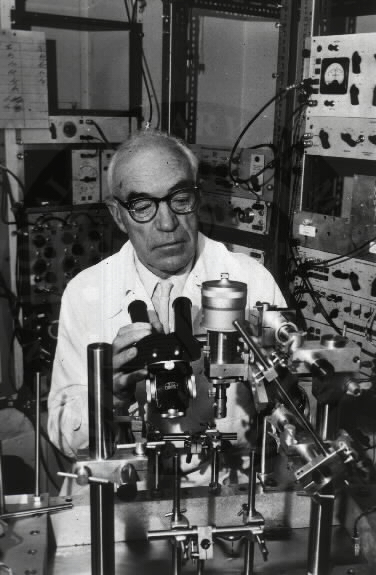- John Carew Eccles
Infobox_Scientist
name = Sir John Eccles

image_width = 150px
caption = John Eccles, shown here at his lab bench
birth_date = birth date|1903|1|27|mf=y
birth_place =Melbourne , Australia
death_date = death date and age|1997|5|2|1903|1|27
death_place =
residence =
citizenship =
ethnicity =
nationality = Australian
field = Neuroscience
work_institution =
alma_mater =
doctoral_advisor =
doctoral_students =
known_for =
author_abbreviation_bot =
author_abbreviation_zoo =
prizes =Nobel Prize in Physiology or Medicine (1963)
footnotes =Sir John Carew Eccles, AC FRS FRACP FRSNZ FAAS (
January 27 ,1903 –May 2 ,1997 ) was anAustralia nneurophysiologist who won the 1963Nobel Prize in Physiology or Medicine for his work on thesynapse . He shared the prize together withAndrew Fielding Huxley andAlan Lloyd Hodgkin .Biography
Eccles was born in
Melbourne , Australia. He attended Melbourne High School and graduated fromMelbourne University in 1925. He was awarded aRhodes Scholarship to study underCharles Scott Sherrington atOxford University , where he received hisDoctor of Philosophy in 1929.In 1937 Eccles returned to Australia, where he worked on military research during
World War II . After the war, he became a professor at theUniversity of Otago inNew Zealand . From 1952 to 1962 he worked as a professor at theAustralian National University . He won theAustralian of the Year Award in 1963, the same year he won the Nobel Prize.In 1966 he moved to the
United States to work at theInstitute for Biomedical Research inChicago . Unhappy with the working conditions there, he left to become a professor at the University at Buffalo from 1968 until he retired in 1975. After retirement, he moved toSwitzerland and wrote on themind-body problem . He died in 1997 inLocarno , Switzerland.Eccles was a devout
theist and a sometimeRoman Catholic , and is regarded by many Christians as an exemplar of the successful melding of a life of science with one of faith. A [http://muse.jhu.edu/journals/perspectives_in_biology_and_medicine/v044/44.2karczmar.pdf biography] states that, "although not always a practicing Catholic, Eccles was a theist and a spiritual person, and he believed 'that there is a Divine Providence operating over and above the materialistic happenings of biological evolution'..."Research
In the early 1950s, Eccles and his colleagues performed the research that would win Eccles the Nobel Prize. To study synapses in the peripheral nervous system, Eccles and colleagues used the stretch
reflex as a model. This reflex is easily studied because it consists of only twoneuron s: a sensory neuron (themuscle spindle fiber) and themotor neuron . The sensory neuron synapses onto the motor neuron in thespinal cord . When Eccles passed a current into the sensory neuron in thequadriceps , the motor neuron innervating the quadriceps produced a smallexcitatory postsynaptic potential (EPSP). When he passed the same current through thehamstring , the opposing muscle to the quadriceps, he saw aninhibitory postsynaptic potential (IPSP) in the quadriceps motor neuron. Although a single EPSP was not enough to fire anaction potential in the motor neuron, the sum of several EPSPs from multiple sensory neurons synapsing onto the motor neuron could cause the motor neuron to fire, thus contracting the quadriceps. On the other hand, IPSPs could subtract from this sum of EPSPs, preventing the motor neuron from firing.Apart from these seminal experiments, Eccles was key to a number of important developments in
neuroscience . Until around 1949, Eccles believed thatsynaptic transmission was primarily electrical rather than chemical. Although he was wrong in this hypothesis, his arguments led himself and others to perform some of the experiments which proved chemical synaptic transmission.Bernard Katz and Eccles worked together on some of the experiments which elucidated the role ofacetylcholine as aneurotransmitter .Bibliography
* 1932, "Reflex Activity of the Spinal Cord".
* 1953, "The neurophysiological basic of the mind: The principles of neurophysiology", Oxford: Clarendon.
* 1957, "The Physiology of Nerve Cells".
* 1964, "The Physiology of Synapses".
* 1965, "The brain and the unity of conscious experience", London: Cambridge University Press.
* 1969, "The Inhibitory Pathways of the Central Nervous System".
* 1970, "Facing reality: Philosophical Adventures by a Brain Scientist", Berlin: Springer.
* 1973, "The Understanding of the Brain".
* 1977, "The Self and Its Brain", withKarl Popper , Berlin: Springer.
* 1979, "The human mystery", Berlin: Springer.
* 1980, "The Human Psyche".
* 1984, "The Wonder of Being Human - Our Brain & Our Mind", withDaniel N. Robinson , New York, Free Press.
* 1985, "Mind and Brain: The Many-Faceted Problems", (Editor), New York : Paragon House.
* 1989, "Evolution Of The Brain : Creation Of The Self".
* 1994, "How the Self Controls Its Brain ".tyles
* Mr John Eccles (1903-1929)
* Dr John Eccles (1929-1944)
* Prof. John Eccles (1944-1958)
* Sir John Eccles (1958-1997)External links
* [http://nobelprize.org/medicine/laureates/1963/eccles-bio.html Sir John Eccles Biography] . Nobel Foundation.
* Pratt, D.: [http://www.theosophy-nw.org/theosnw/science/prat-bra.htm "John Eccles on Mind and Brain"] . A theosophical view.
* Sabbatini, R.M.E.: [http://www.cerebromente.org.br/n17/history/neurons5_i.htm Neurons and synapses. The history of its discovery IV. Chemical transmission] . "Brain & Mind", 2004.
Wikimedia Foundation. 2010.
